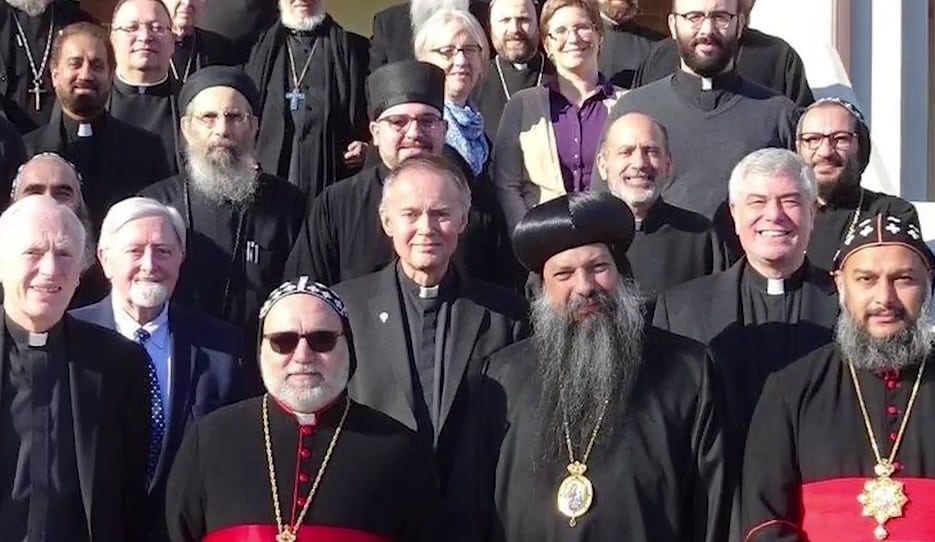February 21, 2018
Paulist Fr. Ron Roberson’s work promoting ecumenical dialogue may well stem from his upbringing.
“My mother was brought up a Presbyterian. My dad was brought up in the Church of the Brethren. They got married in the Church of the Nazarene. And promptly became Methodists,” Fr. Ron says.
When Fr. Ron was studying political science at the University of Kansas, he met a new friend who was a Catholic seminarian, who strongly influenced the course of his faith journey.
“He was running these retreat weekends for college-aged people,” Fr. Ron remembered. “As our friendship developed, I thought, ‘Well this might be an interesting thing to do.’ And so it really opened my eyes.”
During Fr. Ron’s youth, he says, there was a strong element of anti-Catholicism that he adopted. He laughs now as he recalls his thoughts to himself when seeing Catholics attend church: “‘Those pagans!’ you know,” he says. “They worship statues!”
The weekend retreat, “was really my first positive experience of Catholicism and it kind of exposed me to a whole different dimension of Christianity, of the Christian faith and more of a communal sort of experience rather than simply a personal kind, a ‘me and Jesus’ sort of thing. Again I saw this as complementary rather than a negation of my past.”
Fr. Ron’s admiration for his friend from the retreat even led him to the priesthood. While in the Paulist seminary, Fr. Ron’s interest in the diversity of Christianity grew as he learned more about the Christian East and Orthodox churches.
“They would talk about the Eastern understanding of things as, kind of as a different, complementary way of looking at things from the Western and more Latin tradition,” Fr Ron recalled. “I thought this was fascinating.”
Western churches, Fr. Ron says, tend to emphasize authority of individuals, such as the pope, or a pastor, or bishop.
“In the East there has been a tendency … to emphasize the many, and the role of the community in decision-making,” he said. “So I think there’s a sense in which those two things can can balance each other and we can learn from each other.”
Later, after Fr. Ron’s ordination in 1977, he came up with a proposal to the Paulist community.
“I said, ’You know we’re interested in ecumenical work and nobody knows the Christian East very well.’ And I said, ‘I’m really interested in this and wouldn’t it be nice if I could go to Rome and study at this (Pontifical Oriental) Institute and get a doctorate and kind of specialize in Eastern Christianity?’” Fr. Ron recalled. “And so to my enormous surprise they said, ‘Yes, that’s a good idea.’ So a few months later I was on a plane.”
He finished his Ph.D. in Rome, and later was asked to work in the Vatican at the Pontifical Council for Promoting Christian Unity. Fr. Ron says that a highlight was taking part four years in a row in a celebration in Istanbul of the Feast of St. Andrew, founder of the Eastern Church and patron saint of the Orthodox world.
While in Rome, Fr. Ron says it was a thrill to briefly meet several popes, including Popes Benedict XVI and Francis, during ceremonies. But in 1995, Fr. Ron felt called back to his homeland, and returned to the United States to work at the U.S. Conference of Catholic Bishops’ Secretariat for Ecumenical and Interreligious Affairs in Washington, D.C.
While in this role, he’s used his research and experience to help train diplomats at the State Department. “A number of times they’ve asked me to come out there and talk about, say, the Orthodox Church in Greece and something like that.”
In his line of work, Fr. Ron says it’s important to take the long view.
“It’s always steps forward and steps back,” he says. “The trend has been toward greater unity … Christians more and more are emphasizing what we have in common.”
Jennifer Szweda Jordan is a writer and audio producer in Pittsburgh.
Watch a video version of this profile created by Haggerty Media:
Listen to Jennifer’s conversation with Fr. Ron:
